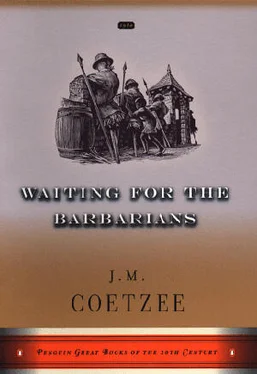Nevertheless it is only on the empty days when I am cast wholly upon myself that I can turn seriously to the evocation of the ghosts trapped between these walls of men and women who after a visit here no longer felt that they wanted to eat and could not walk unaided.
Somewhere, always, a child is being beaten. I think of one who despite her age was still a child; who was brought in here and hurt before her father's eyes; who watched him being humiliated before her, and saw that he knew what she saw.
Or perhaps by that time she could not see, and had to know by other means: the tone his voice took on when he pleaded with them to stop, for instance.
Always I find in myself this moment of shrinking from the details of what went on in here.
After that she had no father. Her father had annihilated himself, he was a dead man. It must have been at this point, when she closed herself off to him, that he threw himself upon his interrogators, if there is any truth in their story, and clawed at them like a wild animal until he was clubbed down.
I close my eyes for hours on end, sitting in the middle of the floor in the faint light of day, and try to evoke the image of that man so ill-remembered. All I see is a figure named father that could be the figure of any father who knows a child is being beaten whom he cannot protect. To someone he loves he cannot fulfil his duty. For this he knows he is never forgiven. This knowledge of fathers, this knowledge of condemnation, is more than he can bear. No wonder he wanted to die.
I gave the girl my protection, offering in my equivocal way to be her father. But I came too late, after she had ceased to believe in fathers. I wanted to do what was right, I wanted to make reparation: I will not deny this decent impulse, however mixed with more questionable motives: there must always be a place for penance and reparation. Nevertheless, I should never have allowed the gates of the town to be opened to people who assert that there are higher considerations than those of decency. They exposed her father to her naked and made him gibber with pain; they hurt her and he could not stop them (on a day I spent occupied with the ledgers in my office). Thereafter she was no longer fully human, sister to all of us. Certain sympathies died, certain movements of the heart became no longer possible to her. I too, if I live long enough in this cell with its ghosts not only of the father and the daughter but of the man who even by lamplight did not remove the black discs from his eyes and the subordinate whose work it was to keep the brazier fed, will be touched with the contagion and turned into a creature that believes in nothing.
So I continue to swoop and circle around the irreducible figure of the girl, casting one net of meaning after another over her. She leans on her two sticks looking dimly upward. What does she see? The protecting wings of a guardian albatross or the black shape of a coward crow afraid to strike while its prey yet breathes?
* *
Though the guards have orders not to discuss anything with me, it is not difficult to stitch together into a coherent story the snatches of talk I hear on my outings into the yard. All the latest talk is about the fire along the river. Five days ago it was just a darker smudge against the haze in the north-west. Since then it has eaten its way slowly down the river-course, sometimes dying down but always reviving, and clearly visible now from the town as a brown shroud over the delta where the river enters the lake.
I can guess what has happened. Someone has decided that the river-banks provide too much cover for the barbarians, that the river would form a more defensible line if the banks were cleared. So they have fired the brush. With the wind blowing from the north, the fire has spread across the whole shallow valley. I have seen wildfires before. The fire races through the reeds, the poplars flare up like torches. Animals that are quick enough-antelope, hare, cat-escape; swarms of birds fly out in terror; everything else is consumed. But there are so many barren stretches along the river that fires rarely spread. So it is clear that in this case a party must be following the fire downriver to see to its progress. They do not care that once the ground is cleared the wind begins to eat at the soil and the desert advances. Thus the expeditionary force against the barbarians prepares for its campaign, ravaging the earth, wasting our patrimony.
* *
The shelves have been cleared, dusted and polished. The surface of the desk glows with a deep lustre, bare save for a saucer of little glass balls of different colours. The room is spotlessly clean. A vase of hibiscus flowers stands on a table in the corner filling the air with scent. There is a new carpet on the floor. My office has never looked more attractive.
I stand beside my guard in the same clothes I travelled in, my underwear washed once or twice but my coat still smelling of woodsmoke, waiting. I watch the play of sunlight through the almond-blossoms outside the window, and am content.
After a long while he enters, tosses a sheaf of papers on the desk, and sits down. He stares at me without speaking. He is trying, though somewhat too theatrically, to make a certain impression on me. The careful reorganization of my office from clutter and dustiness to this vacuous neatness, the slow swagger which he uses to cross the room, the measured insolence with which he examines me, are all meant to say something: not only that he is now in charge (how could I contest that?) but that he knows how to comport himself in an office, knows even how to introduce a note of functional elegance. Why does he think me worth the trouble of this display? Because despite my smelly clothes and my wild beard I am still from an old family, however contemptibly decayed out here in the back of beyond? Does he fear I will sneer unless he armours himself in a décor picked up, I have no doubt, from careful observation of the offices of his superiors in the Bureau? He will not believe me if I tell him it does not matter. I must be careful not to smile.
He clears his throat. "I am going to read to you from the depositions we have gathered, Magistrate," he says, "so that you will have an idea of the gravity of the charges against you." He motions and the guard leaves the room.
"From one: 'His conduct in office left much to be desired. His decisions were characterized by arbitrariness, petitioners had on occasion to wait months for a hearing, and he maintained no regular system of accounting for moneys.' " He lays down the paper. "I may mention that an inspection of your accounts has confirmed that there have been irregularities. 'Despite being principal adminstrative officer for the district, he contracted a liaison with a streetwoman which occupied most of his energies, to the detriment of his official duties. The liaison had a demoralizing effect on the prestige of imperial administration because the woman in question had been patronized by the common soldiers and figured in numerous obscene stories.' I will not repeat the stories.
"Let me read to you from another. 'On the first of March, two weeks before the arrival of the expeditionary force, he gave orders for myself and two other men (named) to prepare at once for a long journey. He did not at that time say where we were going. We were surprised when we found that the barbarian girl would be travelling with us, but we did not ask questions. We were also surprised by the hastiness of the preparations. We did not see why we could not wait for the spring thaw. It was only after our return that we understood that his purpose had been to warn the barbarians of the coming campaign… We made contact with the barbarians on approximately the eighteenth of March. He had long consultations with them from which we were excluded. An exchange of gifts also took place. At this time we discussed among ourselves what we would do if he ordered us to go over to the barbarians. We decided that we would refuse and find our own way home… The girl returned to her people. He was besotted with her, but she did not care for him.'
Читать дальше












